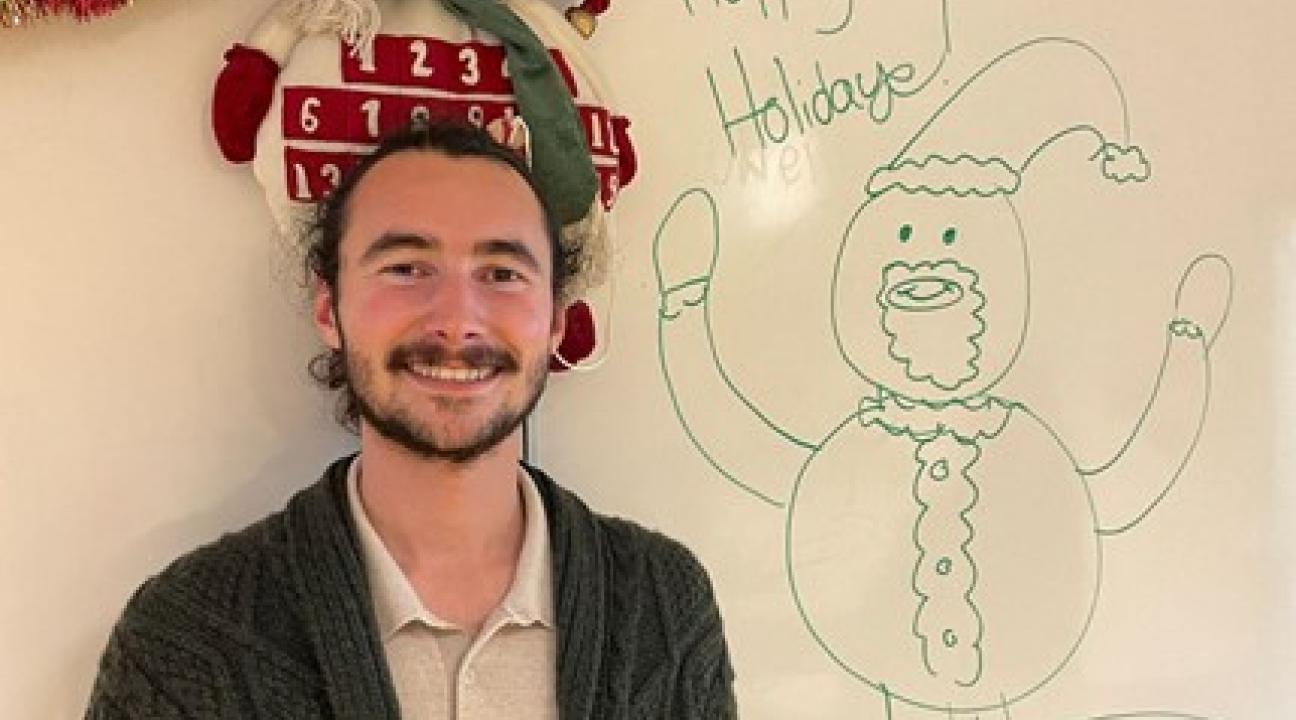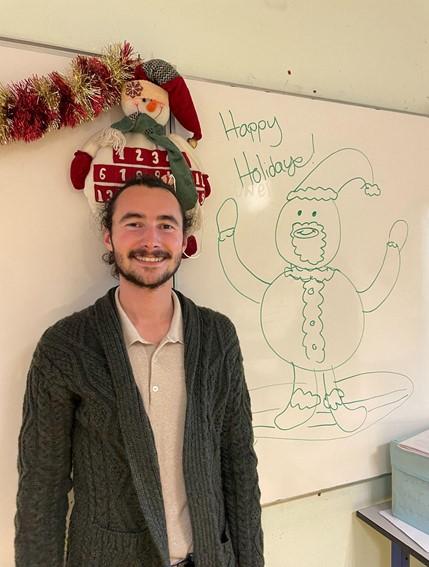Sean Durkin - French
Alumni Spotlight
Sean Durkin graduated from SSU in 2021 with a BA in French and a minor in English.
Tell us about your studies at SSU.
My journey at SSU was anything but usual. My first year I spent in person, the second abroad in Paris, and the third online due to the pandemic. In spite of this, however, I found that my education through this institution enriched my personhood and influenced who I am as a global citizen. Whether it was my A-G requirement courses or my major courses, I discovered a well-connected world of academia that reinforced curiosity and empathy in the modern age. Moreover, both the faculty and student body played a major role in stoking the fire of the atmosphere at Sonoma State. This environment provided me with the opportunities to grow and explore without fear of failure since I knew that I had a team alongside me.
When you were at SSU, did you have any idea of what you would do after graduation?
Even before applying to Sonoma, I knew that I wanted to become an educator. My choice of pursuing my degree at SSU fell in line with my desire to attend a CalState that offered a well-rounded Modern Languages and Literatures department along with the chance to study abroad. It fit like a glove!
How did your studies or activities at SSU influence your future job opportunities / choices?
Based on my major, I knew that teaching French in some capacity had to become the focus of my current journey. I toyed around with the idea of pursuing a graduate degree in French to teach at the collegiate level, but I knew that teaching at the K-12 level would be more my speed at that current juncture.
Tell us about your trajectory after SSU.
After SSU, I attended Pepperdine University's Graduate School of Education and Psychology for their teacher preparation program wherein I received a Master of Arts in Teaching and a California teaching credential at the secondary level. During this time, I worked as a student teacher while attending evening classes. Now, I live in the south of France and work as an English teaching assistant for the Académie de Nice along the Côte d’Azur.
How has your French major helped you in your career?
Immensely! I would not have a career without it. French is integrated into my daily life both in the United States and in France. Knowing the language and francophone cultures has prepared me for taking on working in world language education. Who knows where I would be if I had not taken this path!
How is working in an international setting different?
Oh goodness, this could take a while. To keep it brief, the international setting brings with it many opportunities to stretch your boundaries as a francophone individual. For me personally, the greatest adjustment to working in France has been the low-stakes conversations that happen everyday. Be it with colleagues or students, navigating the expectations and social codes can sometimes hamper my own intuition and emotional involvement. It has taken me a bit of personal work to remind myself that the goal is to communicate effectively and share bits of my own culture. No need to be too harsh on oneself!
How did you find your various positions?
So student teaching was found through the institution itself, and the English assistance program for the United States is known as TAPIF. They take applicants each year.
What is working in your job (or jobs) like? What challenges or benefits have you found?
Working in secondary education is quite dynamic. As I am sure most people are well aware of teachers in recent media, the job demands a great deal from those who choose it. I think that easing your way into it can help combat some of the overwhelming aspects of the job. For example, instead of heading straight into full-time teaching this year, I decided to head to France and work part-time in their education system. This way, not only am I gaining vital experience in the field, I also get to participate in daily French interactions that will benefit my future students. Being able to share an authentic use of French is important for engaging today’s students, and by integrating culturally-relevant pedagogy into this practice will help tomorrow’s students in the United States value the French language and the plethora of vibrant francophone cultures. Thus, I highly suggest going into education, but warn of the dangers of burnout and overcompensating while on and off the clock.
What advice do you have for current students?
I have two pieces of advice for current students. This first one comes from a professor I had while studying at the Sorbonne Nouvelle in Paris. Her name was Dr. Anne-Isabelle François, and I took two upper-level literature courses with her. In the course entitled Les îles infernales, where we read books about dystopian islands, she made us keep a journal as we read the books. The assignment was simple in nature: write down whatever comes to mind after you read. Could have been one to two sentences, could have been a whole developed page. The objective, according to her, was that in order to truly experience the texts, we had to read them first for pleasure, then for analysis. This changed the outlook I had on how to read the multiple books I had been assigned, and it affected the way I saw every other course’s corpus. Please, read your course materials for pleasure. Enjoy learning new information, experiencing a character’s hardships, exploring a genre unfamiliar to you. It makes the academic portion of college way more fascinating. Secondly, your GEs matter. I know that sometimes these courses can seem cumbersome to the process of obtaining your degree. However, I can testify to the power of GEs. It comes down to perspective. Are you viewing this course as an independent requirement that you must complete, or are you viewing this course as an opportunity to make interdisciplinary connections with your major and/or minor? In the former paradigm, you could take a class, get the grade, and move on. In the latter, you could take a class, get the grade, but also soak in the knowledge that you might be able to leverage in your future thesis or career. I know I used theories, intellectuals, and perspectives from the GE courses I took in order to craft my senior thesis. Your college classes can all become connected if you allow it to be, and your experience will be that much more enriched for it.
What do you see yourself doing five or ten years from now?
Hopefully teaching French or English (in a francophone context) in some capacity! You can bet that I’ll be speaking this wonderful language no matter what.



